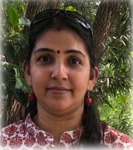 Each hypothesis must be open to be tested, and each belief must be verified to establish reliability and validity. Providing psychosocial support in the hinterlands of Odisha with the collaboration of CYSD with three NGOs gave me a clear invitation to either concede or not concede failure—to me, there was no in between at that time; especially with coordinators, NGO partners (Harsha Trust, Gram Vikas and Srushti) and CRPs who had very little exposure to mental health assignments prior to this project.
Each hypothesis must be open to be tested, and each belief must be verified to establish reliability and validity. Providing psychosocial support in the hinterlands of Odisha with the collaboration of CYSD with three NGOs gave me a clear invitation to either concede or not concede failure—to me, there was no in between at that time; especially with coordinators, NGO partners (Harsha Trust, Gram Vikas and Srushti) and CRPs who had very little exposure to mental health assignments prior to this project.
Collaboration brings strength, learning, and shows us sights beyond what is usually perceivable as the power of ‘you’, ‘me’, ‘us’ and ‘them’. My first hypothesis on the power of collaboration was tested to be true in the due process.
Our initial encounter with the reality in villages was not as encouraging as anticipated. As part of the training design, however, the “prepared to face resistance” mechanism was in-built. Hence, our second hypothesis that people may resist mental health services was validated too. Though a handful of CRPs felt incapable and were suffered their own lack of confidence, a few of them expressed their fear of contamination; while some of them shared their “experience of listening to other’s problems without being able to do anything immediately.”
In the villages, while people wanted material support, we provided psychosocial support; they wanted to know if corona would go soon, we had to prepare them to be able to live with it for as long as a few years; they wanted help in travelling back to their workplaces, we had to sensitize them about their choices; they wanted a job of their choice, we could only inform them about the available government entitlements.
In essence, our CRPs have travelled the road that wasn’t built before. Some of our CRPs and their families tested positive, and attended training whilst in quarantine homes. In particular, Khirodini, one of our CRPs, deserves a big applause for her indomitable spirit. Some of them faced dire network issues which posed a real problem to their online training. The collective efforts of the CRPs are unforgettable. Many CRPs would walk for miles on the village pathways just to be able to reach out.
Gradually people started sharing their traumatic experiences, serious psychological issues, behavioral challenges, and emotional distress with our CRPs, after almost two months of regular visitation and serious trust-building on the part of our CRPs. Issues ranged from fear of death to domestic violence; from substance abuse to suicide attempts; stress of sharing space to helplessness in taking care of children and their education.
Uncertainty, fear, grief, loss were the themes leaving majority of people feeling anxious. People didn’t feel the safety of “knowing” how to deal with the pandemic. However, they were not left alone in this battlefield. Our CRPs sensitized them, supported them, and stayed with them to see their journey go from emotionally vulnerable to emotionally resilient. I extended my support personally and professionally to the CRPs to help them deal with their own emotions and get the confidence to assist others.
Gradually, people started asking for repeated meetings with CRPs, for them to come back at convenient times. In fact, many meetings happened in the harvesting fields and yards.
Accommodating all these people and giving each one individual attention also became a challenge. Some families where alcohol-induced violence was a regular phenomenon restricted their women and girls from speaking up. All of these were problems the CRPs themselves had to tackle. Despite resistance and confidentiality concern 324 distress families were attended for psychosocial requirements.
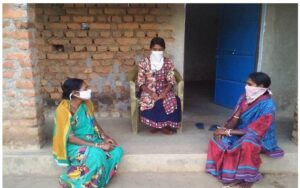 However, every story has an ending—and this doesn’t end with a ‘no’—we found ways to continue providing support through group sessions. An increasing number of people started to become vocal about their emotional vulnerability, thanks to the courage of a particular CRP Hemalata, who conducted thirteen group sessions out of a total of twenty-nine sessions in a span of two months. It was such a profound experience to see 436 SHG members being sensitized on the prevalence of mental health and emotional awareness. Toofan from Gram Vikas literally worked on a war footing mode and contributed to the supervisions through his case presentations.
However, every story has an ending—and this doesn’t end with a ‘no’—we found ways to continue providing support through group sessions. An increasing number of people started to become vocal about their emotional vulnerability, thanks to the courage of a particular CRP Hemalata, who conducted thirteen group sessions out of a total of twenty-nine sessions in a span of two months. It was such a profound experience to see 436 SHG members being sensitized on the prevalence of mental health and emotional awareness. Toofan from Gram Vikas literally worked on a war footing mode and contributed to the supervisions through his case presentations.
However, I wonder why, unfortunately enough, most men resisted taking this support. They vocally denied their need for “this kind of help”—or perhaps they were unaware they needed it. The active participation of male CRPs might have helped the situation, and in the future the same will undoubtedly strengthen the connect and ease among male clients. In this regard, Anita Mahanta from Srishti, played a crucial role by involving student communities, where boys could also participate. Truly unique.
An assignment like this brings one community close to another—but at the heart of the story there are individuals; there are personal stories. And in our case, at the heart of our story, were women; pregnant women, women with visible signs of domestic violence, women with empty stomachs who were beaten up every day for not cooking food that suited the tastes of men in their house. To these individual stories, we were witnesses with empathy. To these individual traumas, we were enablers of emotional expression. To these individual minds, we were a container of their pain and struggle.
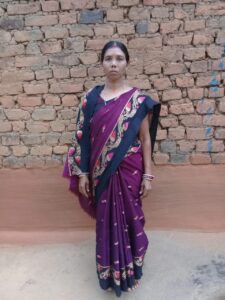 The road which was unheard-of in August 2020 was almost ready by December 2020; and the travelers of this road ready by the last week of December 2020. They voluntarily reached out to us and declared the existence of mental illnesses in their families; one call led to another. I mention Phulamani with special emphasis here, one of our most resourceful CRPs, who helped the heads of almost seven families get in touch with me and plan for their treatment.
The road which was unheard-of in August 2020 was almost ready by December 2020; and the travelers of this road ready by the last week of December 2020. They voluntarily reached out to us and declared the existence of mental illnesses in their families; one call led to another. I mention Phulamani with special emphasis here, one of our most resourceful CRPs, who helped the heads of almost seven families get in touch with me and plan for their treatment.
They openly shared “what does it mean to have a mentally ill child, parent or in-law” and desperately wished for intervention. At this crucial juncture—indeed a milestone in itself—we faced a shortage of resources; mainly in the logistics.
At such a time, collaboration between The Director, MHI, Cuttack, CDMO Keonjhar, psychiatrists from Keonjhar Hospital and Psychosocial Support Team from CYSD provided respite and promise to these patients and their families; an ambulance was also arranged, which was instrumental in their access to the due medical infrastructure; it is with great happiness and optimism that I write about their on-going treatment, which has resulted in not only obvious health changes in them, but also in a gradual change in the social mindscape of their families and community.
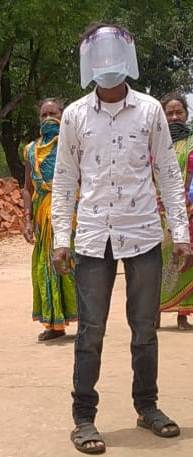 “Our community people show their strong resistance for taking the Covid vaccine because of fear of psychosis. The reason being, if anyone is found Covid positive, the health personnel will take him/her away from our community during night; put the patient in an unknown hospital and not allow relatives to stay with the patient; and finally without giving any medicines the doctor will declare the patient is dead (as we see in TV). Thus, my community does not have faith on doctors,” shared Nageswar Haraka, a Community Volunteer from Rekhapadar Village of Kolnara Block, Rayagada without any hesitation.
“Our community people show their strong resistance for taking the Covid vaccine because of fear of psychosis. The reason being, if anyone is found Covid positive, the health personnel will take him/her away from our community during night; put the patient in an unknown hospital and not allow relatives to stay with the patient; and finally without giving any medicines the doctor will declare the patient is dead (as we see in TV). Thus, my community does not have faith on doctors,” shared Nageswar Haraka, a Community Volunteer from Rekhapadar Village of Kolnara Block, Rayagada without any hesitation.
 In a relatively short time, Debjeet had made very important contributions relating to justice, environment protection and evolving a new development paradigm. His contribution to looking at tribal communities living in remote areas from a perspective of appreciating and understanding their world view and learning from them has been particularly commendable, as many of those working with tribal communities do not go beyond well-intentioned but limited attitudes of help and patronage.
In a relatively short time, Debjeet had made very important contributions relating to justice, environment protection and evolving a new development paradigm. His contribution to looking at tribal communities living in remote areas from a perspective of appreciating and understanding their world view and learning from them has been particularly commendable, as many of those working with tribal communities do not go beyond well-intentioned but limited attitudes of help and patronage.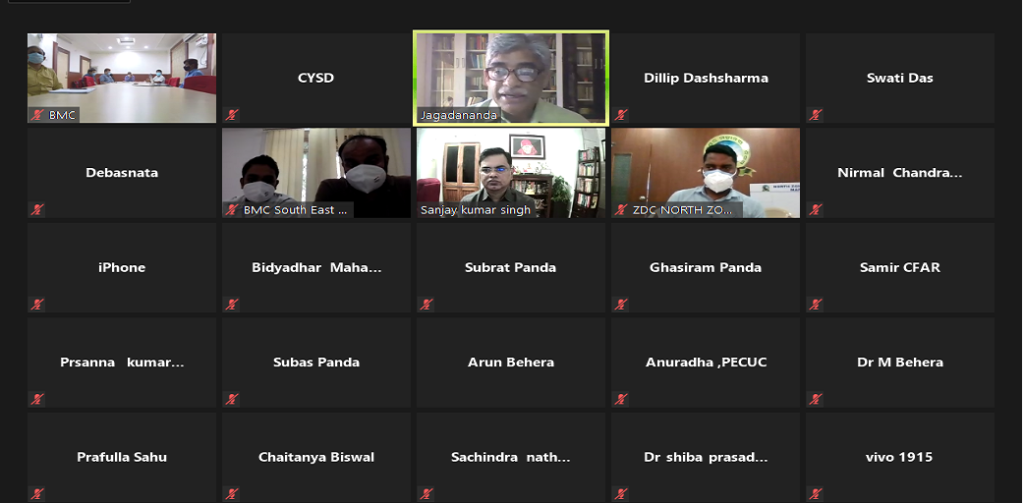 The virtual meeting was moderated by Shri Jagadananda, the Co-founder & Member-Secretary of CYSD. Addressing the virtual meeting, the Commissioner of BMC Shri Sanjay Singh welcomed the citizen leaders of Bhubaneswar Municipal Corporation and appealed for the need of a multi stakeholder approach to overcome the pandemic crisis. Shri Singh, with the presence of his Zonal Deputy Commissioners, apprised the current strategy, issues and problems on the ground and the steps taken by the Municipal Corporation so far to deal with the challenges.
The virtual meeting was moderated by Shri Jagadananda, the Co-founder & Member-Secretary of CYSD. Addressing the virtual meeting, the Commissioner of BMC Shri Sanjay Singh welcomed the citizen leaders of Bhubaneswar Municipal Corporation and appealed for the need of a multi stakeholder approach to overcome the pandemic crisis. Shri Singh, with the presence of his Zonal Deputy Commissioners, apprised the current strategy, issues and problems on the ground and the steps taken by the Municipal Corporation so far to deal with the challenges.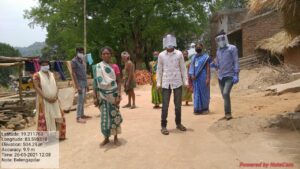 In a mission mode, the Rayagada district administration, especially Kolanara Block Development Officer sought the collaborative support hand of CSOs in the process of Covid Vaccination, RTPCR, Rapid Antigen Test, TTT (Test, Track & Treatments) Policy implementation and home to home survey involving community based organisations and grassroots volunteers for mass awareness creation. Responding to the call made by Kolnara Block Administration at the GO-NGO Coordination meeting, CYSD, being a key play in Rayagada district, extended its obligatory support in 10 Gram Panchayats (GPs) of Konara Block. The GPs are Suri, Kolanara, Badhakilapadar, Dunduli, Gadisekhal (5 GPs in plain area) and 5 GPs above Kailsh Ghati like, Rekhapadar, Bhoimoda, Katikana, Bankili and Jhoridi.
In a mission mode, the Rayagada district administration, especially Kolanara Block Development Officer sought the collaborative support hand of CSOs in the process of Covid Vaccination, RTPCR, Rapid Antigen Test, TTT (Test, Track & Treatments) Policy implementation and home to home survey involving community based organisations and grassroots volunteers for mass awareness creation. Responding to the call made by Kolnara Block Administration at the GO-NGO Coordination meeting, CYSD, being a key play in Rayagada district, extended its obligatory support in 10 Gram Panchayats (GPs) of Konara Block. The GPs are Suri, Kolanara, Badhakilapadar, Dunduli, Gadisekhal (5 GPs in plain area) and 5 GPs above Kailsh Ghati like, Rekhapadar, Bhoimoda, Katikana, Bankili and Jhoridi.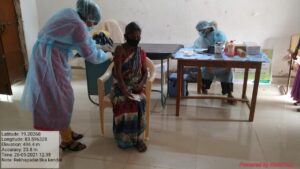 CYSD field volunteers along with ANM, ASHAs and Anganwadi Workers jointly took an innovative step to persuade the tribal people i.e. by adopting a strategy to reach every house from village to village in 10 GPs. Through this intervention out of 2247 eligible persons for vaccination in Rekhapadar GP, a total of 45 person took the first dose in one go. “This is quite encouraging for my GP, I am quite sure, adopting this mobilisation process, my GP will achieve 100 % vaccination in next 2-3 months”, said Ms. Jayanti Tadingi, Sarapanch, Rekhapadar Gram Panchayat.
CYSD field volunteers along with ANM, ASHAs and Anganwadi Workers jointly took an innovative step to persuade the tribal people i.e. by adopting a strategy to reach every house from village to village in 10 GPs. Through this intervention out of 2247 eligible persons for vaccination in Rekhapadar GP, a total of 45 person took the first dose in one go. “This is quite encouraging for my GP, I am quite sure, adopting this mobilisation process, my GP will achieve 100 % vaccination in next 2-3 months”, said Ms. Jayanti Tadingi, Sarapanch, Rekhapadar Gram Panchayat.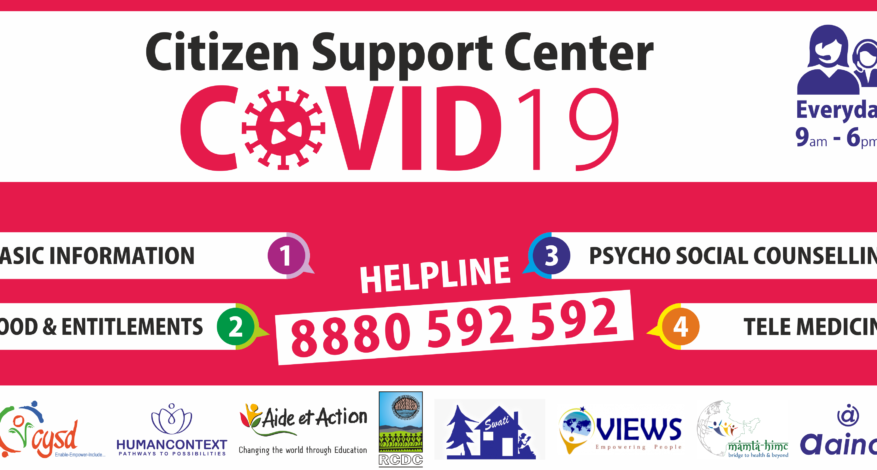
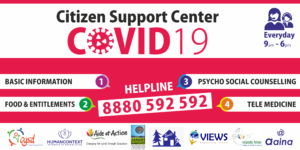 With the activation of Citizen Support Centre (CSC) in association with seven likeminded organisations, now the common citizenry are getting definite solutions relating to Covid impact using a toll-free Helpline No. 8880 592592 which remains open from 9.00 am to 6.00 pm every day.
With the activation of Citizen Support Centre (CSC) in association with seven likeminded organisations, now the common citizenry are getting definite solutions relating to Covid impact using a toll-free Helpline No. 8880 592592 which remains open from 9.00 am to 6.00 pm every day.

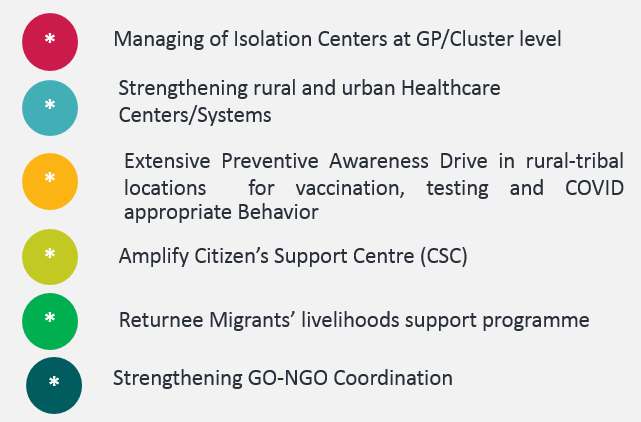
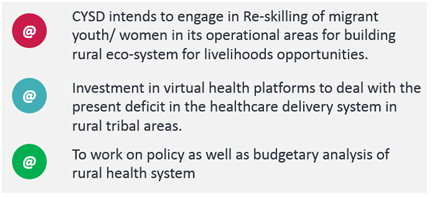
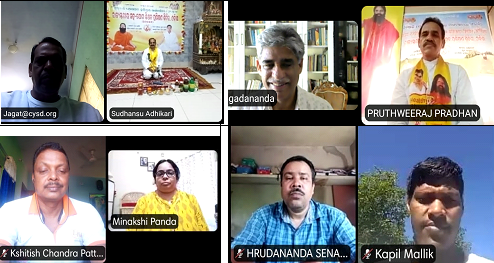
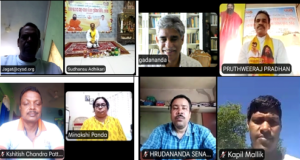 Sri Pruthveeraj Pradhan and Sri Sudhanshu Adhikari were part of the yoga session. Sri Adhikari steered the session by requesting everyone to chant ‘Om’ followed by the chanting of popular Hindu mantras. It helped in generating positive energy and a calm surrounding for the upcoming activities.
Sri Pruthveeraj Pradhan and Sri Sudhanshu Adhikari were part of the yoga session. Sri Adhikari steered the session by requesting everyone to chant ‘Om’ followed by the chanting of popular Hindu mantras. It helped in generating positive energy and a calm surrounding for the upcoming activities.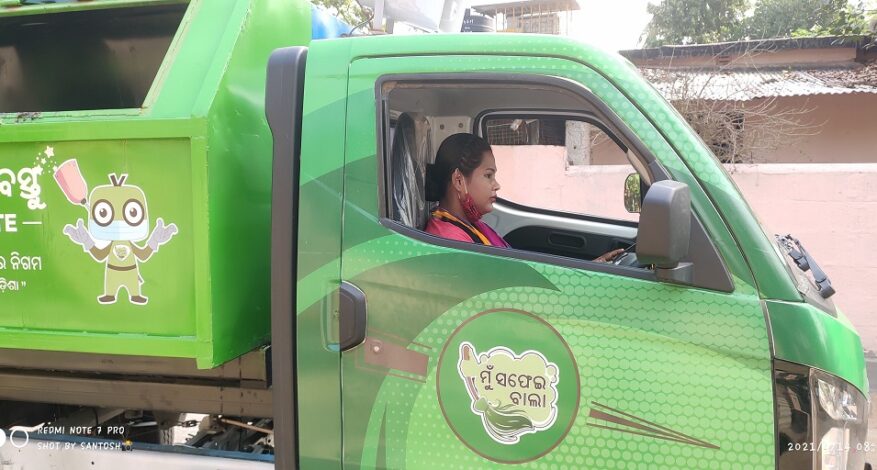
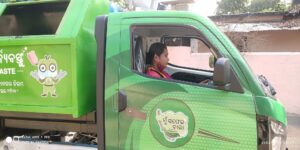 On the occasion of International Women’s Day (8th March, 1999), CYSD launched the WoW programme in collaboration with Azad Foundation and Mahindra Finance in Bhubaneswar to train women between 18-35 age group from various slums in the city to become chauffeurs.
On the occasion of International Women’s Day (8th March, 1999), CYSD launched the WoW programme in collaboration with Azad Foundation and Mahindra Finance in Bhubaneswar to train women between 18-35 age group from various slums in the city to become chauffeurs.
 Each hypothesis must be open to be tested, and each belief must be verified to establish reliability and validity. Providing psychosocial support in the hinterlands of Odisha with the collaboration of CYSD with three NGOs gave me a clear invitation to either concede or not concede failure—to me, there was no in between at that time; especially with coordinators, NGO partners (Harsha Trust, Gram Vikas and Srushti) and CRPs who had very little exposure to mental health assignments prior to this project.
Each hypothesis must be open to be tested, and each belief must be verified to establish reliability and validity. Providing psychosocial support in the hinterlands of Odisha with the collaboration of CYSD with three NGOs gave me a clear invitation to either concede or not concede failure—to me, there was no in between at that time; especially with coordinators, NGO partners (Harsha Trust, Gram Vikas and Srushti) and CRPs who had very little exposure to mental health assignments prior to this project. However, every story has an ending—and this doesn’t end with a ‘no’—we found ways to continue providing support through group sessions. An increasing number of people started to become vocal about their emotional vulnerability, thanks to the courage of a particular CRP Hemalata, who conducted thirteen group sessions out of a total of twenty-nine sessions in a span of two months. It was such a profound experience to see 436 SHG members being sensitized on the prevalence of mental health and emotional awareness. Toofan from Gram Vikas literally worked on a war footing mode and contributed to the supervisions through his case presentations.
However, every story has an ending—and this doesn’t end with a ‘no’—we found ways to continue providing support through group sessions. An increasing number of people started to become vocal about their emotional vulnerability, thanks to the courage of a particular CRP Hemalata, who conducted thirteen group sessions out of a total of twenty-nine sessions in a span of two months. It was such a profound experience to see 436 SHG members being sensitized on the prevalence of mental health and emotional awareness. Toofan from Gram Vikas literally worked on a war footing mode and contributed to the supervisions through his case presentations. The road which was unheard-of in August 2020 was almost ready by December 2020; and the travelers of this road ready by the last week of December 2020. They voluntarily reached out to us and declared the existence of mental illnesses in their families; one call led to another. I mention Phulamani with special emphasis here, one of our most resourceful CRPs, who helped the heads of almost seven families get in touch with me and plan for their treatment.
The road which was unheard-of in August 2020 was almost ready by December 2020; and the travelers of this road ready by the last week of December 2020. They voluntarily reached out to us and declared the existence of mental illnesses in their families; one call led to another. I mention Phulamani with special emphasis here, one of our most resourceful CRPs, who helped the heads of almost seven families get in touch with me and plan for their treatment.